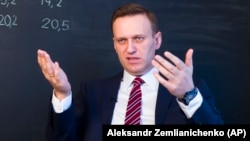Russia: Moscow police search activists' homes
| Publisher | Radio Free Europe/Radio Liberty |
| Publication Date | 22 December 2017 |
| Cite as | Radio Free Europe/Radio Liberty, Russia: Moscow police search activists' homes, 22 December 2017, available at: https://www.refworld.org/docid/5a9fc6daa.html [accessed 1 June 2023] |
| Disclaimer | This is not a UNHCR publication. UNHCR is not responsible for, nor does it necessarily endorse, its content. Any views expressed are solely those of the author or publisher and do not necessarily reflect those of UNHCR, the United Nations or its Member States. |
December 22, 2017 08:54 GMT
RFE/RL
 The Protesting Moscow movement was established after mass anticorruption rallies on March 26 organized by opposition politician Aleksei Navalny (above).
The Protesting Moscow movement was established after mass anticorruption rallies on March 26 organized by opposition politician Aleksei Navalny (above).
Police in Moscow searched the homes of three activists of an opposition group called Protesting Moscow on December 22.
Protesting Moscow said on social media that police were searching the homes of Olga Chezare, Roman Kogan, and Roman Rashimas. It said police gave no reason for the searches and took the activists' phones.
The Protesting Moscow movement was established after mass anticorruption rallies on March 26 organized by opposition politician Aleksei Navalny in Moscow and about 100 other Russian cities.
The searches came ahead of planned demonstrations on December 24 by supporters of Navalny and other opposition figures.
The March 26 rallies were among the largest protests since a wave of demonstrations in 2011-12. Many were held without government permission.
Police detained more than 1,000 people in Moscow alone, including Navalny, a Putin foe and anticorruption crusader who is seeking to challenge Putin in a March 18 presidential election.
Several activists were arrested on suspicion of attacking police officers at the Moscow rally. Four of them have been convicted and sentenced to prison terms ranging from eight months to four years.
Some of them were sent to serve their terms in so-called colony settlements, penitentiaries in which convicts live close to an industrial facility or a farm where they work.
Election officials said in June that Navalny is ineligible to run for president due to a financial-crimes conviction that he contends was politically motivated.
Link to original story on RFE/RL website
